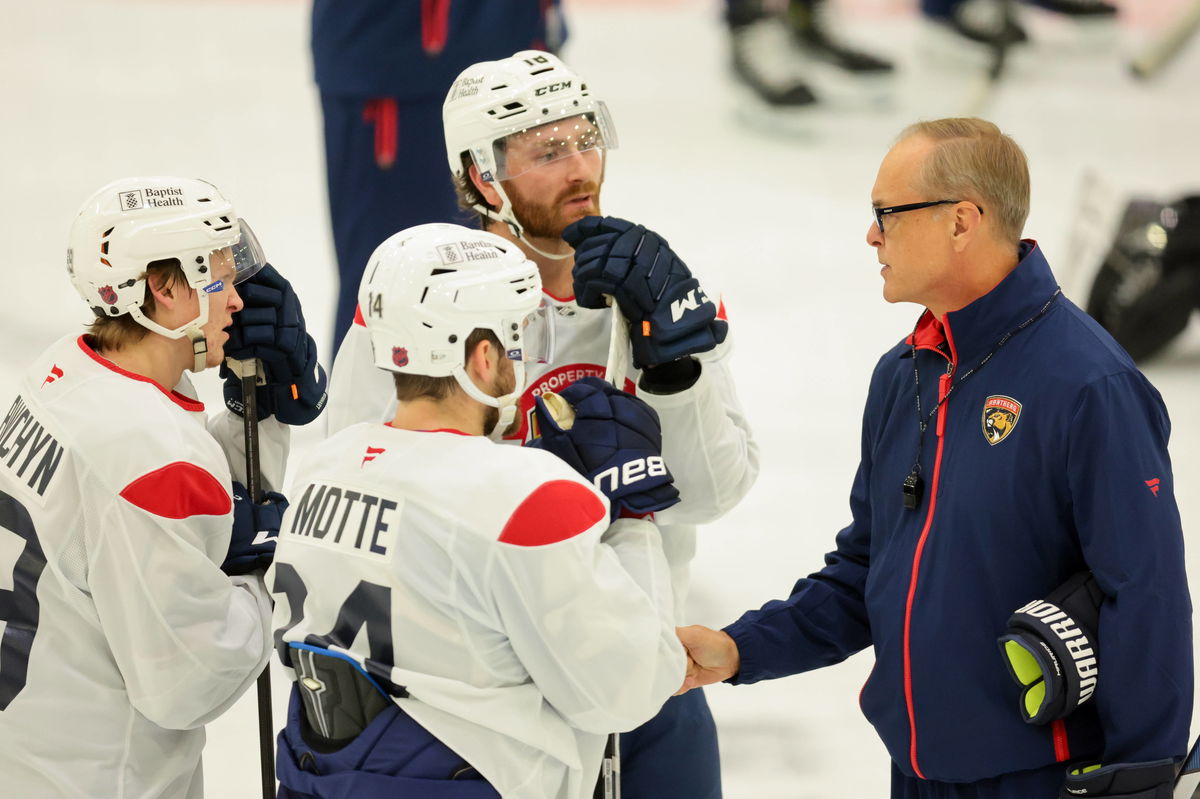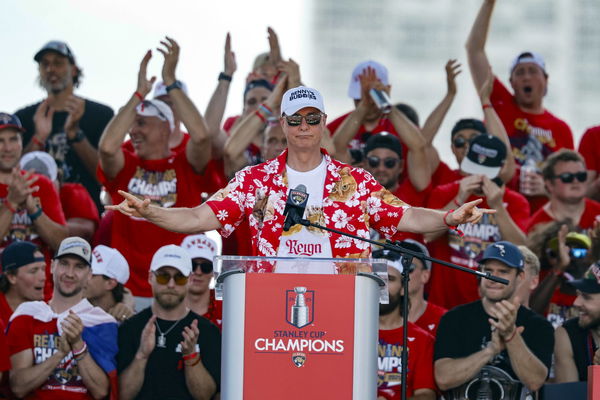
Imago
NFL, American Football Herren, USA Florida Panthers Practice Sep 19, 2025 Fort Lauderdale, FL, USA Florida Panthers head coach Paul Maurice speaks to center Gracyn Sawchyn 59, forward Tyler Motte 14 and forward Noah Gregor 18 during training camp at Baptist Health IcePlex. Fort Lauderdale Baptist Health IcePlex FL USA, EDITORIAL USE ONLY PUBLICATIONxINxGERxSUIxAUTxONLY Copyright: xSamxNavarrox 20250919_SN_na2_01442

Imago
NFL, American Football Herren, USA Florida Panthers Practice Sep 19, 2025 Fort Lauderdale, FL, USA Florida Panthers head coach Paul Maurice speaks to center Gracyn Sawchyn 59, forward Tyler Motte 14 and forward Noah Gregor 18 during training camp at Baptist Health IcePlex. Fort Lauderdale Baptist Health IcePlex FL USA, EDITORIAL USE ONLY PUBLICATIONxINxGERxSUIxAUTxONLY Copyright: xSamxNavarrox 20250919_SN_na2_01442

Imago
NFL, American Football Herren, USA Florida Panthers Practice Sep 19, 2025 Fort Lauderdale, FL, USA Florida Panthers head coach Paul Maurice speaks to center Gracyn Sawchyn 59, forward Tyler Motte 14 and forward Noah Gregor 18 during training camp at Baptist Health IcePlex. Fort Lauderdale Baptist Health IcePlex FL USA, EDITORIAL USE ONLY PUBLICATIONxINxGERxSUIxAUTxONLY Copyright: xSamxNavarrox 20250919_SN_na2_01442

Imago
NFL, American Football Herren, USA Florida Panthers Practice Sep 19, 2025 Fort Lauderdale, FL, USA Florida Panthers head coach Paul Maurice speaks to center Gracyn Sawchyn 59, forward Tyler Motte 14 and forward Noah Gregor 18 during training camp at Baptist Health IcePlex. Fort Lauderdale Baptist Health IcePlex FL USA, EDITORIAL USE ONLY PUBLICATIONxINxGERxSUIxAUTxONLY Copyright: xSamxNavarrox 20250919_SN_na2_01442
Under the guidance of Head Coach Paul Maurice, the Florida Panthers have cemented their place in modern NHL history by securing back-to-back Stanley Cup championships, a feat that required not only elite skill but also an unparalleled level of mental and physical endurance. The team’s victory in the 2025 Stanley Cup Final, built upon their first title win in 2024, is a testament to a culture of resilience that Maurice has meticulously cultivated. This culture is not born during the pressure of the playoffs but is forged in the grueling, often unglamorous, environment of training camp.
Watch What’s Trending Now!
Maurice’s specific approach to camp—a philosophy centered on extreme hard work, unified standards, and a clear, almost brutal, practicality—is what he credits for preparing his teams for the long and demanding path to a championship. As seen on FloridaHockeyNow’s YouTube channel, during a media session following a training camp practice in Fort Lauderdale, Maurice offered a candid and detailed explanation of his methodology. He immediately established that hard camps are a non-negotiable constant for his teams, stating, “I think we’ve always had hard camps.”
For Maurice, a key objective is to achieve equality. “When you come in as a new coach one of the first things you want to get rid of is the strata of your room; the stratification in your room,” said Maurice. “And that one player will be treated different necessarily. The expectations of the outcomes, the expectations of outcome are different or you can pay one guy 10 million and one guy 775. There’s a reason for that. But we have to find common ground.”
This does not ignore the reality that a star player has different performance expectations than another competitor, or that a $10 million salary commands a different level of responsibility than a league-minimum contract. Maurice acknowledges these differences are necessary but argues that “we have to find common ground when we want all the money,” pointing to the collective financial and competitive success that comes from a united team effort.
The “common ground” he seeks is not in salary or role, but in a shared commitment to an exceptionally high and uniform standard of effort. Maurice’s approach is strategically pragmatic rather than purely punitive. He revealed that the initial test group experienced a lighter day, a 45-minute session that he described as “a light day,” because “we didn’t beat these guys into the ice because now they’re going into the heart, and we didn’t—nobody can survive two weeks of that.”
This calculation shows an understanding of athlete management, pacing the intensity to build stamina rather than break players. However, this moderation is temporary. Maurice emphasized the relentless and repetitive nature of what follows, noting, “We’ll go back, and we will run the exact same practices for the exact same three years, four days, no fun.” This repetition is designed to ingrain the team’s systems and expectations to the point of instinct, ensuring consistency and reliability when fatigue sets in during critical moments of a game.

Imago
June 22, 2025, Fort Lauderdale, Fl, USA: Florida Panthers head coach Paul Maurice addresses the crowd as players celebrate on stage during the team s Stanley Cup victory parade and rally along A1A on Sunday, June 22, 2025, in Fort Lauderdale, Florida. Fort Lauderdale USA – ZUMAm67_ 20250622_zaf_m67_028 Copyright: xAlxDiazx
Perhaps the most revealing part of Maurice’s philosophy is his emotional detachment from the process. He admitted, “I don’t take any joy in it. I’ve seen these guys work so hard, and I don’t—I don’t love doing it either.” This acknowledgment separates his methods from a desire to be a taskmaster; the hardship is not an end in itself but a necessary means to an end. He contrasts his approach with what might be expected for veteran players who have already proven themselves, thinking, “Well, they don’t have to do it anymore, right? Because they’ve already proven that they can.”
But for Maurice and the Panthers, that is not an option. The standard does not lower with success. In fact, the expectation is the opposite: “And we’re not doing that; we’re going as hard as we’ve ever gone.” This commitment to maintaining intensity, even after achieving the ultimate success, is a core tenet of his leadership. It reflects a belief that complacency is the enemy of champions and that the foundation for a Stanley Cup is poured every September in the exhausting, repetitive drills of training camp.
This unwavering demand for hard work from every player, regardless of status, has been a key ingredient in transforming the Florida Panthers from a talented team into a modern dynasty. And the players that play on his team are quite fond of him.
His honest remarks about the Florida Panthers’ coach
Sam Bennett, freshly crowned Stanley Cup champion and Conn Smythe Trophy winner, stunned many by accepting an eight-year extension with the Florida Panthers—earning $8 million per year—rather than chasing a bigger payday through free agency. His reasoning? It wasn’t really about the cash; it was all about Paul Maurice. Bennett said Maurice is “by far the best coach I’ve ever had,” and he really seems excited about the chance to play under him for years ahead.
Maurice isn’t just a system-maker; he really gets Bennett’s intensity, grit, and edge—and he doesn’t try to hold it back. During the playoffs, Maurice really showered Bennett with public praise, often throwing in some playful humor too. During Game 3 of the Stanley Cup Final, there was this unforgettable moment when Maurice made a joke about his star forward, saying, “He’s got a horrible attitude… we’re not sure he can be cured. It’s just below dengue fever—maybe bubonic plague.”
Ever since he was traded from Calgary in 2021, Bennett’s production has really taken off. He’s racked up 196 points in 289 games, thrown down over 600 hits, and had a career high of 51 points in the 2024–25 season. On the flip side, during his time in Calgary, he managed to rack up just 140 points over 402 games. That transformation really shows what Maurice offers him: the freedom to be himself and the support to thrive. Bennett ultimately ended up sticking around because he discovered a place he could call home, not just a contract, with a coach who really understands him.

